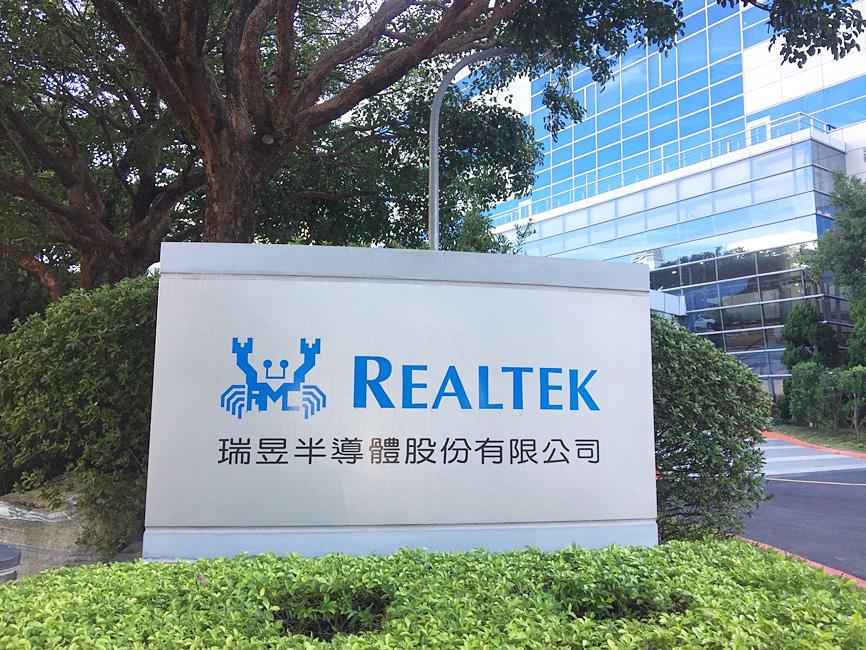Networking chip supplier Realtek Semiconductor Corp (瑞昱半導體) yesterday posted a record high net profit for the first quarter of the year, as exuberant demand for chips used in commercial PCs and Internet infrastructure offset slack demand for consumer electronics and chromebooks for students.
The Hsinchu-based chipmaker expects the uptrend to extend into this quarter, despite COVID-19 lockdowns in China that have snarled logistics and halted factories’ operations.
“Overall, demand looks very resilient in the short term. We are cautiously optimistic about the second quarter,” Realtek spokesman Huang Yee-wei (黃依瑋) told an online investors’ conference.

Photo: Hung You-fong, Taipei Times
The company is seeing strong growth momentum for its Ethernet chips and switch controllers this quarter as it benefits from network upgrades, Huang said.
There are no signs indicating a slowdown, he said.
The lockdowns in Shanghai have led to logistical issues and longer delivery times, but the curbs have so far not depressed demand, he added.
A growing number of companies are likely to join Taiwan Semiconductor Manufacturing Co (台積電) and ASE Technology Holding Co (日月光投控), a chip testing and packaging services provider, and reopen their Chinese operations after receiving approval from the Shanghai government, Huang said.
The company is monitoring the situation in Ukraine, China COVID-19 infections and high inflation worldwide, which could weaken demand in the long term, he said.
While scarcity of semiconductors remains a bottleneck, Realtek has added more foundry partners, but it does not expect to see a significant improvement in supply any time soon, he added.
“Based on our current observations, there is little change compared with what we saw three months ago. Chip shortages will not be resolved in the short term,” Huang said. “We are still facing pressure from further price increases [by foundry partners], but the hikes should be less steep than last year.”
Realtek posted a net profit of NT$5.19 billion (US$177.4 million) for the first quarter of the year, an increase of 69.8 percent from NT$3.06 billion in the same period last year.
On a quarterly basis, net profit rose 12.6 percent from NT$4.61 billion.
Earnings per share climbed to NT$10.15 from NT$5.98 a year earlier and NT$9.02 a quarter earlier.
Gross margin rose to 52.2 percent from 44.8 percent in the first quarter last year, but declined from 52.9 percent in the final quarter last year.
Revenue grew 27.5 percent year-on-year, or 8.7 percent quarter-on-quarter, to NT$29.76 billion, an all-time high.

The New Taiwan dollar is on the verge of overtaking the yuan as Asia’s best carry-trade target given its lower risk of interest-rate and currency volatility. A strategy of borrowing the New Taiwan dollar to invest in higher-yielding alternatives has generated the second-highest return over the past month among Asian currencies behind the yuan, based on the Sharpe ratio that measures risk-adjusted relative returns. The New Taiwan dollar may soon replace its Chinese peer as the region’s favored carry trade tool, analysts say, citing Beijing’s efforts to support the yuan that can create wild swings in borrowing costs. In contrast,

Nvidia Corp’s demand for advanced packaging from Taiwan Semiconductor Manufacturing Co (TSMC, 台積電) remains strong though the kind of technology it needs is changing, Nvidia CEO Jensen Huang (黃仁勳) said yesterday, after he was asked whether the company was cutting orders. Nvidia’s most advanced artificial intelligence (AI) chip, Blackwell, consists of multiple chips glued together using a complex chip-on-wafer-on-substrate (CoWoS) advanced packaging technology offered by TSMC, Nvidia’s main contract chipmaker. “As we move into Blackwell, we will use largely CoWoS-L. Of course, we’re still manufacturing Hopper, and Hopper will use CowoS-S. We will also transition the CoWoS-S capacity to CoWos-L,” Huang said

Nvidia Corp CEO Jensen Huang (黃仁勳) is expected to miss the inauguration of US president-elect Donald Trump on Monday, bucking a trend among high-profile US technology leaders. Huang is visiting East Asia this week, as he typically does around the time of the Lunar New Year, a person familiar with the situation said. He has never previously attended a US presidential inauguration, said the person, who asked not to be identified, because the plans have not been announced. That makes Nvidia an exception among the most valuable technology companies, most of which are sending cofounders or CEOs to the event. That includes

INDUSTRY LEADER: TSMC aims to continue outperforming the industry’s growth and makes 2025 another strong growth year, chairman and CEO C.C. Wei says Taiwan Semiconductor Manufacturing Co (TSMC, 台積電), a major chip supplier to Nvidia Corp and Apple Inc, yesterday said it aims to grow revenue by about 25 percent this year, driven by robust demand for artificial intelligence (AI) chips. That means TSMC would continue to outpace the foundry industry’s 10 percent annual growth this year based on the chipmaker’s estimate. The chipmaker expects revenue from AI-related chips to double this year, extending a three-fold increase last year. The growth would quicken over the next five years at a compound annual growth rate of 45 percent, fueled by strong demand for the high-performance computing